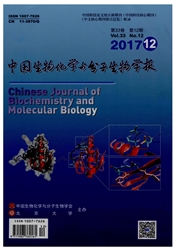

 中文摘要:
中文摘要:
蛋白质合成的忠实性对细胞活力非常重要,否则会干扰细胞的生理过程,甚至导致疾病.生物已经进化出多种机制以维持翻译的准确性,包括底物选择、校对和转肽后的质量控制机制.这些机制在氨基酸活化、翻译起始、延伸和终止等不同阶段发挥作用.现在,对蛋白质合成的研究已经延伸到了其它领域,如病原体致病机制、耐药性,以及药物开发等.本文主要综述了蛋白质合成起始、延伸和终止过程的忠实性机制,以及mRNA的质量控制方式,并对相关研究在抗生素药物及药物靶点开发方面的应用前景做了展望.
 英文摘要:
英文摘要:
Translational accuracy critically influences cell viability since inaccurately translated proteins interfere with the processes essential to cellular fitness and cause disease.Numerous fidelity mechanisms have evolved to control the accuracy of translation,including substrate selection,proofreading,and quality control mechanism after peptide bond formation.These processes act at various steps during peptide synthesis,such as amino acid activation,translation initiation,elongation and termination.Now,the study of protein synthesis has extended to some other fields,including pathogenic mechanism,resistance and drug development.In this article,the fidelity mechanisms of translational initiation,elongation and termination,together with the mechanism of mRNA quality control,were discussed.Furthermore,their application perspective in developing antibiotics and drug targets were speculated.
 同期刊论文项目
同期刊论文项目
 同项目期刊论文
同项目期刊论文
 期刊信息
期刊信息
